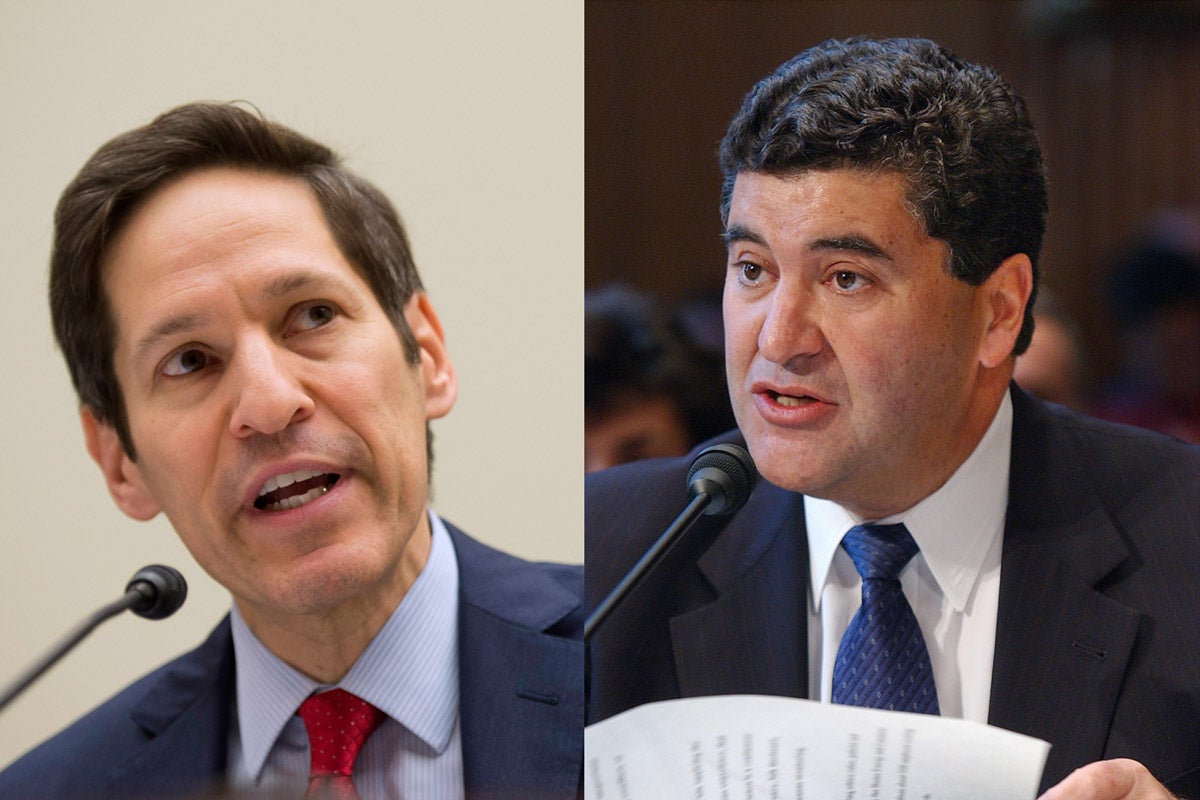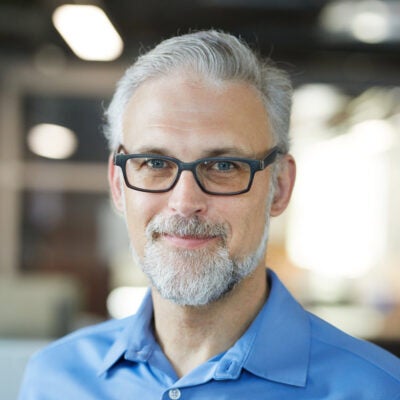
Ideas
A bipartisan perspective on public health’s uncertain future
Public health has been a staple in the news since the re-election of Donald Trump as president of the United States, thanks in part to Trump’s choice of Robert F. Kennedy Jr. to run the Department of Health & Human Services. Kennedy’s history of anti-vaccine activism, and musings about eliminating research into infectious disease, have drawn ire. Less controversial is his focus on the connection between processed foods and chronic disease and the country’s mediocre overall health results. Separate threats of radical changes to—and budget cuts for—agencies like the Centers for Disease Control and Prevention (CDC) and the National Institutes of Health (NIH) have also sparked attention.
Elias Zerhouni, director of the NIH under George W. Bush, and Tom Frieden, who directed the CDC under Barack Obama, met on Zoom in late December with several dozen journalists to give a bipartisan perspective on what might transpire for public health.
The discussion was organized and led by Larry Tye, director of the Health Coverage Fellowship of the Center for Health Communication at the Harvard T.H. Chan School of Public Health.
What follows is an edited and condensed version of the hour-long discussion, which included opening remarks by both Zerhouni and Frieden, followed by questions from Tye and from some of the journalists in attendance, representing KFF Health News, Politico, STAT News, the Washington Post, WBUR and others.
- The transition process between administrations
- The future of the CDC
- The future of NIH
- The U.S. and global health
- Can U.S. health care be fixed?
- Robert F. Kennedy, Jr. and vaccines
- Robert F. Kennedy, Jr. and what we eat
- Addiction policy
- On health equity
- Biggest fears
- How can the media rebuild trust?
What’s unique about this transition between administrations?
Elias Zerhouni: Every transition [between presidential administrations] is different. [This one is] going to be very different than [Trump’s] first term, because the group in charge seems to have very, very determined views on how to run the government for the next four years. They know what they want to do. They don’t want to hear from the current administration. Naming your whole cabinet and nominating the head of NIH, the Food and Drug Administration, the CDC, the HHS secretary before the beginning of the administration, that’s unique. It took me 16 months after George Bush started his tenure to be nominated and confirmed by the Senate.
There are lots of rumors that are, in my view, a little bit premature. You never really know what’s the balance between what you think they’re going to do and what they will do, because there are political considerations at all times. The key thing here is going to be protecting these agencies from becoming political footballs.
Tom Frieden: When the new gang gets in [to office] they’ll have fixed views, but they’ll also need to learn and understand some of the nitty gritty of the entities that they’re trying to lead, even if they want to change them. As Elias said, it’s striking how quickly they’re moving to get people nominated and likely confirmed, or at least many of them.
But to hit the ground running, you have to actually know how to make the government function.
Sign up for Harvard Public Health
Delivered to your inbox weekly.
On the future of the CDC
Frieden: Every institution could be better, right? There are things that do need to improve. But in government, it’s not usually the case that blowing something up makes it better.
I’m really quite concerned about CDC and proposals to break it up into multiple agencies, or proposals to eliminate the Injury Center or [National Center for Chronic Disease Prevention and Health Promotion] or [National Center for Environmental Health].
Obviously, one risk to CDC is budget cuts. There have been very misguided proposals to break the agency up and have it only deal with infectious diseases. It would be a little strange to end the chronic disease programs at the leading preventive agency in the U.S. [Chronic diseases] are the things that kill most Americans and make infectious diseases more deadly, so [the CDC] need to deal with them.
The second major threat is to vaccines. It’s much more pervasive than [anti-vax]. If you look at just one example, the Advisory Committee on Immunization Practices—there’s no industry influence. Parents and pediatricians are all involved. If the ACIP is disbanded or packed with anti-vax people by the HHS Secretary—who appoints the members—not only do the recommendations change, but that’s what drives insurance reimbursements and school requirements.
It’s important not to overstate the loss of trust in CDC—the data shows that the decrease in trust is among Republicans, that there’s been essentially no decrease in trust among Democrats. This may be cold comfort. And it’s not specific to CDC—it’s about science expertise [and] government in general.
It reflects a frustration that I think we can have a lot of sympathy with. It’s a frustration with our lack of control of our economic future, our lack of understanding of what kind of toxins are in our environment, our lack of access to decent health care. One hundred million Americans lack a primary care clinician, despite the fact that we spend more than four trillion dollars a year on health care, twice as much as the average of rich countries.
On the future of the NIH
Zerhouni: In my time, it was one of the few agencies that had strong bipartisan support, and was really considered the crown jewel of federal agencies. Things have changed with the pandemic. You have a whole faction out there, Sen. Rand Paul [and] others, who have it in for NIH. It’s lost its apolitical status, and it’s lost some of its bipartisan support, and I think trust in science generally is down. There’s going to be a readjustment, and Monica [Bertagnolli, NIH’s director since November 2023], unfortunately, has not been here long enough to establish those good relationships that you need as an NIH director with Congress and the appropriators, including within the administration. [Editor’s note: Bertagnolli resigned January 14.] So I think it’s going to be rocky, and I am worried about NIH.
Frieden: We absolutely need to look at NIH because it is a jewel. But we need to look at all of the agencies, including the ones that are not so visible but may have really important roles to play, whether it’s in regulation or specific programs.
On the U.S. and global health
Frieden: PEPFAR [The President’s Emergency Plan for AIDS Relief] is at great risk. PEPFAR is, without a doubt, a huge success story. Twenty-five million lives saved, seven million children born without HIV because of it, economies all over Africa renewed from it. And huge goodwill toward the United States as a result—I’ve had multiple career ambassadors say to me nothing we do advances U.S. interests as much as the good work we do in PEPFAR.
It’s likely that the Trump administration will pull out of WHO, as it did before. That will make the U.S. and the world less safe and give us less of a voice in what happens in global health.
Zerhouni: One other topic I would put on your radar screen is genetically modified organisms and foods. Kennedy seems to be against it like Europe is against it. Facts tell you that [banning GMOs] would be very, very destructive to a lot of emerging nations and poorer nations. It was 20 years ago when a country that was under a famine was prevented from importing GMO foods by the Europeans, and they had hundreds of thousands of deaths. [Editor’s note: Zerhouni is referring to Zambia in 2002. Several other southern African nations, Malawi, Mozambique, and Zimbabwe, also declined GMO food aid that year.]
The central issue is the concept of individual rights versus community rights. And leaning towards saying, “Well, community has no rights, we decide whatever we want for our kids” is really the issue that comes up all the time between the risk and benefit of public health activities.
Can U.S. health care be fixed?
Frieden: Primary care is an area where there could be some motion over the next four years. It’s really shameful and shocking the degree to which the U.S. spends a lot of money and doesn’t get a lot of value out of health care. We have fantastic, high-tech health care, second to none, but in terms of health outcomes from the essential services that most people should get, we do a terrible job. There are plenty of countries that do better, and in terms of health policies, including food policies that RFK Jr. has talked about, countries as varied as Chile and Argentina and Mexico have much better policies than we have.
In health, America isn’t first. America is like 49th in health status in the world. If we want to be first in health status, what would that look like? Well, it would be a very different set of public health policies, health care policies, and broader policies on things like air quality and other issues.
Zerhouni: [Health care is] a monster, if you talk to economists. Even the Federal Reserve considers health care and its runaway costs one of the major, major threats to the American economy in the future. And yet nobody talks about it. The [outside] comparisons are very useful. I’ve been a global traveler and had to deal with many health systems, and I would say that our health system is probably the worst in the world right now, from the point of view of developed economies.
“It’s really shameful and shocking the degree to which the U.S. spends a lot of money and doesn’t get a lot of value out of health care.”
Tom Frieden, director of the CDC under Barack Obama
What about RFK Jr.’s anti-vax ideas?
Frieden: I don’t know whether or not he will be confirmed. The anti-vax stuff is very concerning. If you look at what he and his group did in Samoa—there was a tragic incident [in 2018] where a nurse made a mistake, she put an expired muscle relaxant into the MMR [measles, mumps, and rubella] vaccine and gave it to two children who died. It had nothing to do with MMR.
[RFK] went there [in June 2019]. They lifted up the anti-vax groups in Samoa. When vaccine rates went down, more than 83 people died, most of them kids. You also have [Dave] Weldon, the nominee to head CDC, having repeated the debunked claim of a link between vaccines and autism. More than 25 studies have looked at this. We know that the suggestion that this was occurring was promoted by Andrew Wakefield in a fraudulent claim to make money.
Zerhouni: We always talk about foreign countries like Samoa and Zambia, but you know, deaths from measles have arisen here in California, in Germany, in France. So it’s not like it’s going to spare us because we have herd immunity.
What about RFK Jr.’s talk about food?
Frieden: A lot of what he says makes sense on the face of it. But is he actually going to do things that make a difference, or is this just performative, just for PR? We know about the main things that cause chronic disease in the U.S.—it’s tobacco, it’s alcohol, it’s soda and sugary beverages, it’s PM 2.5 [the technical term for] soot. That’s what causes the vast majority of the preventable heart attacks, strokes, cancer, diabetes in the U.S.
If you want to really make progress, you have to do things like take on big tobacco, take on the industries that put things into our environment that are harmful. And that hasn’t been a traditional Republican priority.
Zerhouni: I believe that Kennedy’s programs have both a bad side on the vaccines, but a good side on chronic disease and the environmental effects. His position on chronic diseases is a good one. Eighty percent of our [health care] costs are related to chronic diseases, and of that, 50 or 60 percent is related to lifestyle choices [like] food. In 1920, Americans consumed about 18 to 20 pounds of sugar [annually]. Now it’s 200 pounds, coming from different sources, enhanced sugars in food and processed food, and so on.
As Tom said, it’s not that easy to get [change] through, because you have a lot of vested interests. When I was the NIH director, I was asked to do a study on obesity, and we came up with the conclusion that, number one, [to address it] you had to really change the food chain, and sugar in particular. I went to my appropriations head, and I said, “We have to do something about [sugar]. We should do it like tobacco. We should tax it.”
And he said, “Are you kidding? I won’t be reelected if you do that.” And he was saying, “The most important bill I deal with is the Farm Bill, which gives 60 billion dollars of subsidy to the corn syrup industry. How do you want me to fight that?”
Frieden: To be clear, the phrase “lifestyle” implies that it’s people’s fault. If we want to address chronic disease, we’re not going to do it by hectoring people to do calisthenics and eat healthier. We’re going to do it by changing the default choices so they’re healthier, and that is with things like taxation and more availability of healthier foods. Other countries do very good work with making information apparent when you’re buying something at the supermarket. So if it’s really unhealthy, it has a warning label on it like tobacco.
Zerhouni: You’re not going to change the system overnight, but I think the incentives are actually stacked against us. And we need to change that. For example, you know the [farm] subsidy, which is 60 billion dollars a year, going mostly to large companies, not farmers, could be used to transition the agriculture economy from an unhealthy to a healthy landscape. To promote that notion over time would be a real, real benefit for the American people. Because the food supply chain is the problem. It’s been shaped by context, by addictive behaviors—liking sugar is addictive in some ways. We tried twice to create an Institute of Nutrition [at] the NIH, and twice we were opposed by a lot of vested interests.
Frieden: To give two examples of the kind of interference that comes up, Congress one year mandated that CDC and three other federal institutions come up with an analysis and recommendations on what to do about marketing of unhealthy food to children. The industry then woke up, and in the following year we were mandated not to do that report. And it’s not just sugar. High salt probably kills more people than high sugar, and it’s everywhere. It’s in breakfast cereals. It’s in baby food. It’s way more than you would put in at the table, and it gets you accustomed to that amount of salt. We were mandated by Congress not to work on sodium reduction at one point. The economic interests here are very powerful.
Zerhouni: There are inherent obstacles to change. We need to really tackle that. I’m hopeful that perhaps Kennedy will be able to move the needle a little bit, because that’s the one good side of his political or policy statements that I’ve heard from him.
Will addiction policy change?
Frieden: My number one concern is the CDC’s National Center for Injury Prevention and Control could be eliminated. That’s the lead agency that guides public health response to this crisis. There’s been good bipartisan support to address the overdose crisis. I have always believed that interdiction is important. Not all public health people agree with that. If you make the analogy to tobacco, there’s price elasticity. The harder it is to get and the more expensive it is, the less people will use it. And I think we’re seeing that.
You have leaders in Congress like [Rep.] Hal Rogers [R-Kentucky], who has really understood the whole gamut of interventions needed to address opiate overdose, from education, to treatment, to enforcement, to community development things. We’re seeing an openness to other approaches, including finally making buprenorphine policy more rational to improve access to and quality of treatment for addiction. We’ve seen a major lifting of restrictions on buprenorphine. We’ve seen Narcan become much more available. We’ve seen experiments with safe injection spaces. I think you may see more openness to some of the newer treatment modalities, including psychedelics. I don’t think they’re going to be a magical cure for people, but they may have a role.
To the extent you weaken the capacity of public health to track trends and respond to them, you risk the little bit of progress [we’ve had] in the last year or two going in the wrong direction.
“I’m hopeful that perhaps Kennedy will be able to move the needle [on food] a little bit, because that’s the one good side of his political or policy statements that I’ve heard from him.”
Elias Zerhouni, director of the NIH under George W. Bush
On equity and health
Frieden: One of the major risks is the elimination of programs that are intended to address the populations in greatest need. That includes CDC programs, NIH programs, HRSA programs and others. Another very major risk is Medicaid. The [Trump] administration has talked about not cutting Medicare. But they haven’t said they’re not cutting Medicaid.
There’s also the public discourse, what gets talked about, what gets studied, what gets prioritized. One way forward could be looking at all groups that have disproportionate needs. That includes rural Trump voters.
Sometimes public health can have a little bit of a blind spot. We understand why some groups, because of historical injustices, need particular outreach. But if we’re going to reach everyone to get vaccination rates up or cancer prevention done or opiates addressed, we have to address each community.
Zerhouni: I separate health disparities from DEI. They’re two different topics in my mind. Fundamentally, access to good health care was not assured in socioeconomic environments that could not afford it. It wasn’t an issue of race only. You saw it in West Virginia. You saw it in areas where there was no racial disparity. You saw it in Mississippi. My conclusion was that the structure of our health care system is basically biased against folks who don’t have a socioeconomic situation that allows them to access [the system].
Our health care system needs restructuring. We need to cover everybody. It’s unacceptable for a country that spends four trillion dollars [on health care] to have all these Band-aid programs. But if you look at the statistics, it hasn’t improved [outcomes] over the past 20 years.
DEI is another issue, part of the culture wars that are ongoing. I don’t think it has a direct impact on the health disparities themselves. We have had proper programs, like Tom said, for years, and they haven’t really moved the needle. We have 4,500 federally qualified health care centers. They do a lot of good work, but they leave a lot of people out, as we’ve seen during the pandemic.
Biggest fears with the new administration
Zerhouni: Because [Trump administration officials] will be sort of talking to themselves, [I fear] they will address many things all at once and solve nothing. The second is for my field, biomedical research, maintaining our science and technology strength. Research has gone from small labs that do their things to truly team science and studies of populations and studies of diseases that are affecting the great majority of people. Utilizing AI, utilizing new technologies, and the competition for that is going to be a global competition, including with China.
Frieden: [I fear] a lot of people in the U.S., and around the world, could die because of the disruption of effective programs and the continued undermining of trust in government and science.
How can the media rebuild trust?
Zerhouni: I think the role of journalists is to focus on data. For example, you hear from Trump, “Well, you know, autism just exploded in the country, so there must be a reason,” but that is not correct. There was a change in diagnostic categories, and if you looked at it from that point of view, you see that there was a diagnosis that was very, very common in the past—developmental delay or inappropriate development—that has gone down tremendously. There’s no more of that diagnosis. It’s all autism and autism spectrum disorder. That kind of fact setting, and that truth, should be really [journalists’] duty, because no one else can really do this and not be accused of having a bias.
The other thing is, analysis of positions is primarily about the messenger, not about the message. Oh, is he a Democrat? Is he a Republican? Did he work for a pharma company? Well, therefore it’s biased. The unbiasing of the information and the factualness of it is really the essence of the work we need to do in a democracy. If you don’t have a ground truth, you really can’t govern, and that’s what’s happening a little bit here. There’s a tremendous amount of ad hominem dismissal of ideas.
Frieden: It is telling that trying to point out what is fact and what is fiction is considered partisan.
There are things that are debatable. Much misinformation has kernels of truth. We don’t want to oversimplify and say, if there’s a kernel of truth, “Oh, this is totally wrong.” But the way it’s used, it gets weaponized.
So if we talk about vaccines, look, Covid vaccines are extremely safe. They greatly reduce the risk of death, particularly in people who are older. Is there a valid debate about whether everyone should get them every year? Absolutely. The U.S. recommends every six months for the highest risk people, every year for everyone else. But some other countries say, “We’ve got a good health system, so we’re not going to vaccinate younger adults because we’re going to save the money.”
Top image, Zerhouni: Dennis Cook / AP Photo, File; Frieden: Molly Riley / AP Photo, File



